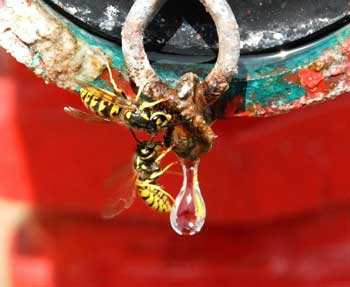The seasonal battle to stop the establishment of European wasps in Western Australia has begun, following the discovery of a nest in a southern Perth suburb.
Department of Agriculture and Food senior technical officer and chair of the European Wasp Working Group Marc Widmer said a nest had been destroyed in Munster, thanks to the keen eye of the public.
“The householder reported an unusual wasp find to the department’s Pest and Disease Information Service (PaDIS), which allowed us to track down and destroy the nest, preventing the breeding and release of potentially thousands of European wasp queens,” Mr Widmer said.
“It is this sort of community involvement which has helped keep these pests at bay since the first European wasp nest was discovered in Perth 37 years ago.”
European wasps are considered the world’s worst wasp pest and Western Australia remains the only place in the world to have prevented their establishment for so long.
“Our horticulture, viticulture, tourism, apiculture industries and environment would suffer if they established here,” Mr Widmer said.
“Every year fertilised queens are accidentally shipped to Western Australia from the eastern states and start new nests.
“We are urging the community to watch out for European wasp activity and report it to the department.”
This summer will involve a widespread surveillance effort including 550 surveillance traps operated by the department and 330 traps ‘adopted’ by local governments, community groups and individual volunteers.
“We began the adopt-a-trap program in 2011 and the initiative has gained real momentum thanks to strong support from the community,” Mr Widmer said.
Last summer the department destroyed 39 nests, all in the Perth metropolitan area.
The department will again be looking for volunteers to adopt wasp traps this summer in Perth and in high risk regional areas, particularly Kalgoorlie, Albany, Geraldton and Bunbury.
Information about the ‘adopt-a-trap’ initiative is available by emailing info@agric.wa.gov.au.
“We also urge anyone who thinks they have spotted a European wasp or a nest to contact the Pest and Disease Information Service on freecall 1800 084 881,” Mr Widmer said.
“European wasps superficially resemble the common yellow paper wasp with bright yellow and black striped bodies, but are more stout and bee-shaped and don’t hover.
“European wasps have black antennae and are unusual as they feed on meat and protein products and usually nest in the ground.”

Media contacts: Jodie Thomson/Lisa Bertram, media liaison +61 (0)8 9368 3937
